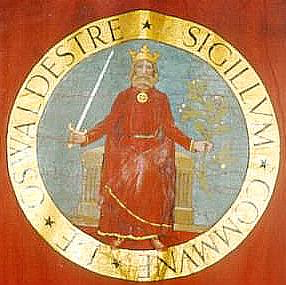Tags
Ambrosius, Anglo-Saxons, Arthur, Arthurian, Battle of Camlann, Camlann, Ceredig, King Arthur, kingship, Post-Roman, Sub-Roman Britain
 The other day I was working on a broad history of the post-Roman period and I came across Oswald, a king of the Northumbrians during the seventh century. A little math and I realized he had lived to the ripe old age of fifty-eight. Keeping in mind the general maximum for the non-religious during the era, he had lived three years beyond what any person could reasonably expect to be. I was, tongue away from cheek, astonished.
The other day I was working on a broad history of the post-Roman period and I came across Oswald, a king of the Northumbrians during the seventh century. A little math and I realized he had lived to the ripe old age of fifty-eight. Keeping in mind the general maximum for the non-religious during the era, he had lived three years beyond what any person could reasonably expect to be. I was, tongue away from cheek, astonished.
Then again, kings did have certain advantages over commoners. Certainly they participated in battles and, in an era when a strap of leather tied around the ankles passed for shoes, one bad move could have anyone on their back or limping with a broken ankle. In the hall no one knew the Heimlich Maneuver, so a loose bone in the throat could kill any person. With a diet focused on meat, heart disease was an issue as well. As a person’s bodily secretions were considered holy they never bathed, which made a perfect environment for communicable diseases.
And yet a man like Oswald lived to fifty-eight. And fought battles.
In battle, every member of a king’s war-band was absolutely committed to the king’s life first and foremost. If the king’s life was at risk, it was every man’s responsibility and holy duty to stand between him and death. If the king died and a single warrior from his war-band survived he was humiliated.
That might seem a little extreme to us, living as we do in a world where politicians are regularly found to be dishonest and are dispensed with easily, where loyalty is more the office of the gullible than the elite of society it may seem odd to us that warriors would so willingly and so inevitably lay down their lives for their lord. But it is not unheard of even in this century. The President of the United States is a man constantly protected by bodyguards.
 And the Early Medieval King, of the Irish, Pictish, British, or Germanic peoples, had a much more personal bond to his men than the President has with those who protect him. Every day for their first few years of service, warriors lived in their king’s hall, partaking of his bounty in the food they ate, the drink they imbibed, even in the women they enjoyed. The king gave them silver off of his person, weaponry and armor from his personal cache, coins, horses, dogs. When they had proven their worth they were allowed to live away from the hall in their own homes. Still, they remained on the king’s land and lived off of his wealth. For a warrior, everything that he was, that he had enjoyed, that he owned, was due to his king. He was everything because of his lord, and he must have felt like he would be nothing without him. No wonder that the war-band was utterly loyal to their king to the death.
And the Early Medieval King, of the Irish, Pictish, British, or Germanic peoples, had a much more personal bond to his men than the President has with those who protect him. Every day for their first few years of service, warriors lived in their king’s hall, partaking of his bounty in the food they ate, the drink they imbibed, even in the women they enjoyed. The king gave them silver off of his person, weaponry and armor from his personal cache, coins, horses, dogs. When they had proven their worth they were allowed to live away from the hall in their own homes. Still, they remained on the king’s land and lived off of his wealth. For a warrior, everything that he was, that he had enjoyed, that he owned, was due to his king. He was everything because of his lord, and he must have felt like he would be nothing without him. No wonder that the war-band was utterly loyal to their king to the death.
No wonder that a man like Oswald could live to the ripe old age of 58. He wasn’t alone, either. Even in the first century of British and English kingship (roughly 470 to 670) the occasional individual pops up who managed to live beyond fifty-five, even past sixty on rare occasion.

Although it was a bit later, I always think of Eleanor of Aquitaine. She lived to 86 at a time when fifty was old. Outlived both husbands and all her children. Most of her grandchildren too. Talk about good genes!
You bet, and an intelligent woman too. She also got to be with the love of her life, I’m sure that gave her a few more years.